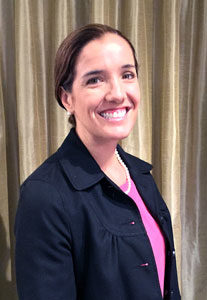 Amy Rodriguez PA-C has joined Drossman Gastroenterology in October 2016 and has already has become an integral part of the practice by enhancing its patient centered philosophy. She participates in all clinic visits and coordinates medication prescriptions and pre-authorizations and communicates with patients through phone calls and messages to optimize their care in a timely fashion.
Amy Rodriguez PA-C has joined Drossman Gastroenterology in October 2016 and has already has become an integral part of the practice by enhancing its patient centered philosophy. She participates in all clinic visits and coordinates medication prescriptions and pre-authorizations and communicates with patients through phone calls and messages to optimize their care in a timely fashion.
Amy graduated in May 2006 from the United States Military Academy at West Point where she was on the Black Knight Parachute Team. Following graduation, she spent six years on active duty as a Paratrooper at Fort Bragg, North Carolina with two deployment tours to Iraq and one to Haiti as a Medical Service Corps officer. She then decided to provide service in the healthcare field and attended the University of North Carolina at Chapel Hill for her PA school prerequisites and worked as a medical assistant at the Central Dermatology Center prior to attending Wake Forest Physician Assistant School, where she graduated in May 2016. She and her graduate school partner were recognized for their research skills by receiving the Kitty Bowman Research Award.
We asked Amy to share a little more about herself in the following Q&A:
Amy: Dr. Drossman applies the biopsychosocial model focusing on the “whole patient” approach. The rewards include seeing firsthand the patients improve and also see how therapeutic it is for them when their concerns are acknowledged and addressed. The challenge is that with chronic pain conditions, such as chronic abdominal pain, we focus on treating the symptoms and working toward improving the patient’s overall quality of life. Getting patients to understand chronic conditions are not cured overnight or immediately can prove to be challenging at times.
Amy: The majority of GI conditions being treated are multi-faceted and chronic. We will work with patients to improve their symptoms and overall quality of life. Yes, there will be good days and bad days but if we can see improvement in the right direction, that is a success. If we never get to 100% cure, 80% improvement is not a failure.
 5826 Fayetteville Rd., Suite 201 Durham, NC 27713
5826 Fayetteville Rd., Suite 201 Durham, NC 27713  (919) 246-5611
(919) 246-5611 